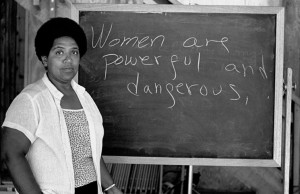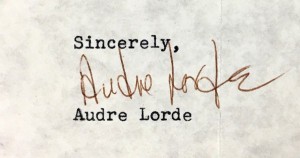Audre Lorde (1934-1992), self identified as a black feminist, lesbian, poet, mother, warrior; she was critical to shaping the intellectual landscape of the women’s movement, black arts movement, black feminist, and gay liberation movements globally. Lorde herself was shaped by a larger sociocultural context of WWII, McCarthyism, and witnessing the unfolding of the Civil Rights Movement.
 Her work often recognized the multitude of identities that were critical to her fight against racism, sexism and homophobia; she theorized the value of difference. She did not stop at theory, but made connection to concrete political action. Her work spanned the U.S., and she spent time teaching and learning in various parts of the world including South Africa and Germany.
Her work often recognized the multitude of identities that were critical to her fight against racism, sexism and homophobia; she theorized the value of difference. She did not stop at theory, but made connection to concrete political action. Her work spanned the U.S., and she spent time teaching and learning in various parts of the world including South Africa and Germany.
Get Involved: The Audre Lorde Project
Audre Lorde was the youngest of three children, born to parents who immigrated from Carriacou, Grenada to Harlem, New York. In her 1982 biomythography Zami, Lorde reflected on some experiences that shaped her, including being a fat, black, visually challenged girl, who did not speak until the age of five. Her early silence gave way to a lifetime of voice through writing and speaking, of writing oneself into existence. She graduated from Hunter high school in 1951, and that same year began her studies at Hunter College. She completed her degree in 1959 and spent much of the 1950s establishing her social and political identities. She was active with gay and lesbian communities in the Village of NYC, and had friends that were part of the Communist party.
 In 1962 she married Ed Rollins and they had two children, Beth and Jonathan. Her marriage to Ed was created consciously and illustrated her commitment to live a life privileging all of her identities including her desire to cultivate her own family.
In 1962 she married Ed Rollins and they had two children, Beth and Jonathan. Her marriage to Ed was created consciously and illustrated her commitment to live a life privileging all of her identities including her desire to cultivate her own family.
Lorde not only recognized was committed to challenging larger systems of power that produced inequality and deemed some lives inherently less valuable. Important essays that reflect her social critique include “The Master’s Tools Will Never Dismantle the Master’s House,” delivered at a conference in NYC in September 1979. There she critiques the larger feminist movement for marginalizing “poor, Black and Third World women.” She posed the challenge to the conference organizers stating; “Racism and homophobia are real conditions of all our lives in this place and time. I urge each one of us here to reach down into that deep place of knowledge inside herself and touch that terror and loathing of any difference that lives there. See whose face it wears.” (Lorde, 2007, 113)
Listen: “The Uses of Anger” (The Poetry Foundation, 2016)
Lorde’s important essay “Poetry is not a Luxury” emphasizes that for women, poetry it is in fact a necessity. In her poem “Power,” she mourns the death of a young black boy with her total self, including her important identity as mother. She begins with a statement:
The difference between poetry and rhetoric
is being ready to kill
yourself
instead of your children.
Watch: “The Edge of Each Others Battles: The Vision of Audre Lorde” (2009)
Lorde offered a framework of liberation that black and diverse groups of feminists and activists could employ.In 1990, there was a conference held in her honor, in Boston Massachusetts, where a diverse group of feminists from the U.S., as well as abroad, gathered to recognize the impact of her work on their own battles. The theme “At the edge of Each other’s Battles’’ illustrated Lorde’s assertions that our struggles for justice are interconnected, and we are in fact diverse in our identities and come to struggles for liberation with our total selves.
 Audre Lorde died in November 1992 in St. Croix where she spent the last several years of her life with her partner Gloria Joseph. She was engaged in a battle with liver cancer, following a mastectomy from breast cancer. She shared her journey with her collection entitled The Cancer Journals (1980). Her final work was entitled The Marvelous Arithmetics of Distance- Poems 1987-1992.
Audre Lorde died in November 1992 in St. Croix where she spent the last several years of her life with her partner Gloria Joseph. She was engaged in a battle with liver cancer, following a mastectomy from breast cancer. She shared her journey with her collection entitled The Cancer Journals (1980). Her final work was entitled The Marvelous Arithmetics of Distance- Poems 1987-1992.
Read:
Audre Lorde, Zami: A New Spelling of My Name. (1982)
Audre Lorde Sister Outsider: Essays and Speeches by Audre Lorde. (1984, 2007)
Alexis de Veaux, Warrior Poet: A Biography of Audrey Lorde by (2006)
